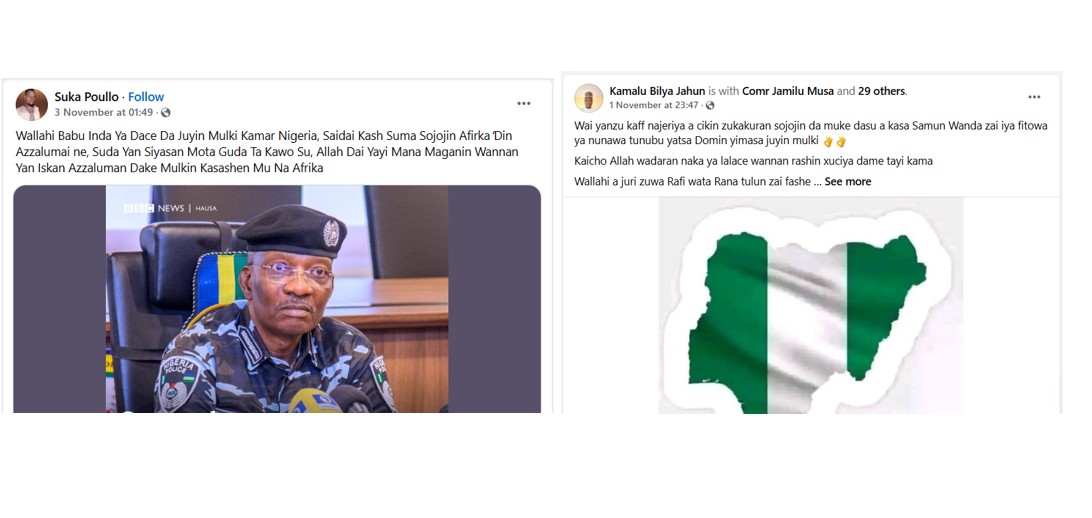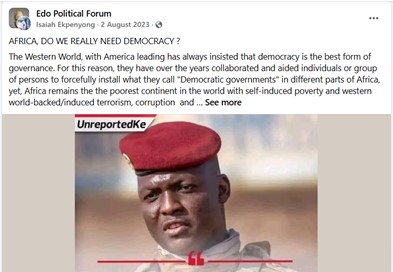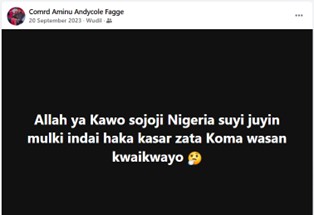Analyzing anti-democracy narratives and advocacy for coup d’etat in Nigeria
By Hamza Ibrahim Following the coup d’etat in Mali, Burkina Faso and Niger Republic, the advocacy for military takeover especially among the youth population in Nigeria has lately gained momentum. This is obvious when one pays attention to social media commentary and conversations. Anti hardship protests that took place in early August have reinforced this […]

screenshot 2025 01 03 170637
By Hamza Ibrahim
Following the coup d’etat in Mali, Burkina Faso and Niger Republic, the advocacy for military takeover especially among the youth population in Nigeria has lately gained momentum. This is obvious when one pays attention to social media commentary and conversations. Anti hardship protests that took place in early August have reinforced this advocacy through published videos and posts that specifically called for coup. The Army Chief had to issue a warning to the coup advocates and pledged allegiance to the democratic structures early this year. Even in October a YouTube channel published a video where an angry man was seen openly advocating for military takeover, after which Defense Headquarters issued another warning for such calls.
The calls for military takeover on social media are made in different forms as can be seen by these Facebook users’ posts A, B, C, D, etc. Depending on the platform and the nature of the dominant conversation mode, the narratives are pushed in varying forms – text, picture or video. Sometimes individual profiles or handles with low following publish but don’t create any dust. But, Facebook pages with over a million followers always drive heavy traction when they post the coup advocacy narratives. For example, this page in what appears to be a way of sparking unending conversations goes sensational by asking their audience to tell them why want a coup in Nigeria. And as expected numerous views were expressed. The majority try to justify their views with the inability of the political administration to address the insecurity situation in parts of the country or the unbearable hardship they have been subjected to. However, beyond not addressing hardship and insecurity which seem to be the dominant reasons many expressed as to why they prefer a military takeover to democracy, are there other factors that may influence or motivate people who elect their leaders by themselves to want to surrender that privilege?

Anti-democracy and pro coup narratives are articulated in articles which are published and shared on Facebook pages and groups alongside other platforms, and this seems to reinforce views that endorse coup and rubbishes democracy.
The articles that are sometimes written by known authors carry weight simply because of the personality of the authors and the public perception towards them. Analysis on such articles found in most cases they have about three constant features. One, their titles try to make their readers lose confidence in democracy entirely, this is done through casting hypotheses that may jump the reader into agreeing with the writer from the onset. Secondly, problems such as bad leadership, poverty, hunger, corruption, etc. get thoroughly discussed and hyped, and the argument is concluded with the ‘failure of democracy’ to solve those problems. The point is then broadened to include points such as ‘Africa has vast natural resource and untapped potentials’, yet democracy hasn’t succeeded in changing the lives of Africans. The third feature is the mention of African countries where coup d’etat happened lately – Mali, Burkina Faso, Niger, Gabon, Equatorial Guinea.
- Customs: How we recovered petrol worth over N100m being smuggled out of Nigeria
- Blackout looms in Abuja over relocation of electricity installations
In trying to sell the anti-democracy and pro-coup narratives, an article published by a politically named group on Facebook exhibited almost all these features. Publishing the piece with picture of the junta leader of Burkina Faso, Ibrahim Traore, it argues:
“Currently, the people of Mali, Burkina Faso and most recently, the Niger Republic have seen their Military overthrew “Democratic Governments” in those countries with citizens cheering them on. These happenings remains a clear signal to the Western world that, Africans are tired of democracy and may be searching for something else that will work for them.”
“The Western world may not like military rule, but they should know and come to term with the fact that their western-backed election rigging to install their puppets in different parts of Africa that will enable the continuous exploitation of our natural resources is worst than coup d’etat, and therefore remains why coup d’etat may remain the only way out to save poor Africans from the hands of extremely corrupt western-backed leaders in Africa.”
“The current extreme hunger in Nigeria caused by an IMF-backed monetary and administrative policies, remains a clear evidence why democracy has failed in Africa. For Africans now, any form or system of governance that will produce good leaders and governance, is highly welcomed.”
From the analysis of the anti-democracy and pro-coup narratives, two things stand out. On the one hand, frustrations and failure to address peoples’ concerns seem to fuel the narratives more. On the other, most young people fall under the mirage that military take overs bring prosperity and development, and had no experience of what military rule actually is like. They therefore have no knowledge of what it means to be under military rule, but hearing about juntas in the Sahel played a role in shaping their perspectives.
Capitalizing on this, Abdullahi Abubakar, a youth activist in a recent interview with the author with the author said “the reason I lost confidence in democracy and prefer military takeover is that the country lacks direction, just take a look at how the political leaders fail to have a regulation on prices of commodities which impacts negatively on the lives of many, the justice system only works on the poor, under military all these will not be applicable”.
In a similar view, another youth activist whom I interviewed over the phone, Abubakar Abdulrahman Ahmad noted “Our opinions don’t count and the representatives represent themselves, corruption and insecurity are pervasive. There is too much hardship and inflation keep rising, the leaders exhibit negligence, I think the military won’t be this bad”.
This Facebook user goes sarcastic to express his endorsement of military rule in Nigeria. In Hausa language, he wrote: “I pray to God that the military take over the affairs of the country if we can’t be serious with governance matters”

Joining the same trend, Umar Shehu’s view buttressed the other views: “There is too much looting in democracy, funds meant for projects are siphoned by few individuals at the expense of the poor, if N100 is budgeted for certain project you find that N80 to N90 goes to some people’s pockets, but the military will not tolerate this level of corruption”
Authoritarian narratives find pasture upon which they flourish among young people. Those under 30 spent 90% of their lives under democratic dispensations and grew up knowing only democratic leaders who they are dissatisfied with. The latest developments of economic hardship, rising inflation, insecurity, corruption and impunity are some of the frustrations the young people suffer from which fuel their opinions military rule.
Hamza Ibrahim is a researcher, journalist, and disinformation analyst based in Kano, Nigeria.
